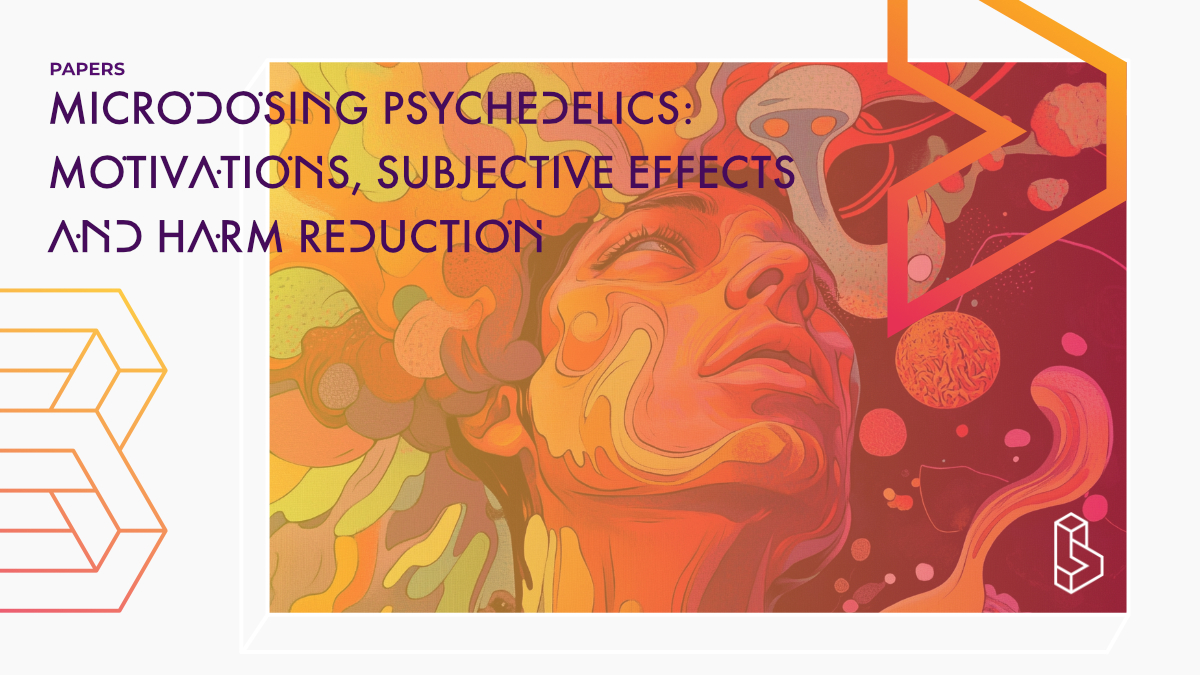This survey study (n=525) found that the motivation for microdosing (psilocybin and LSD) was mainly to improve mental health, personal development, and cognitive enhancement. Four out of five participants used one or more harm reduction techniques on microdosing days (e.g. not dosing when unwell, no alcohol, avoiding driving).
Abstract of Microdosing psychedelics: Motivations, subjective effects and harm reduction
“Background: In recent years there has been growing media attention on microdosing psychedelics (e.g., LSD, psilocybin). This refers to people routinely taking small doses of psychedelic substances to improve mental health and wellbeing, or to enhance cognitive performance. Research evidence is currently limited. This paper examines microdosing motivations, dosing practices, perceived short-term benefits, unwanted effects, and harm reduction practices.
Methods: An international online survey was conducted in 2018 examining people’s experiences of using psychedelics. Eligible participants were aged 16 years or older, had used psychedelics and could comprehend written English. This paper focuses on 525 participants who were microdosing psychedelics at the time of the survey.
Results: Participants were primarily motivated to microdose to improve mental health (40%), for personal development (31%) and cognitive enhancement (18%). Most were microdosing with psilocybin (55%) or LSD/1P-LSD (48%). Principal components analysis generated three factors examining perceived short-term benefits of microdosing: improved mood and anxiety, enhanced connection to others and environment, and cognitive enhancement; and three factors examining negative and potentially unwanted effects: stronger-than-expected psychedelic effects, anxiety-related effects, and physical adverse effects. Most participants (78%) reported at least one harm reduction practice they routinely performed while microdosing.
Conclusion: Our findings suggest that people microdosing are commonly doing so as a self-managed therapy for mental health, either as an alternative or adjunct to conventional treatments. This is despite psychedelics remaining prohibited substances in most jurisdictions. Recent findings from clinical trials with standard psychedelic doses for depression and anxiety suggest that a neurobiological effect beyond placebo is not unreasonable. Randomised controlled trials are needed, complemented by mixed methods social science research and the development of novel resources on microdosing harm reduction.”
Authors: Toby Lea, Nicole Amada, Henrik Jungaberle, Henrike Schecke & Michael Klein
Summary of Microdosing psychedelics: Motivations, subjective effects and harm reduction
The researchers begin by discussing the renewed interest in psychedelics for treating mental and substance use disorders. Recent clinical trials have shown promising results using substances like psilocybin and lysergic acid diethylamide (LSD) to treat conditions such as depression, anxiety, and addiction. Alongside this clinical research, there has been growing media attention on “microdosing” psychedelics. This refers to people routinely taking very small doses of psychedelics (typically 5-10% of a standard dose) without intending to experience noticeable drug effects.
The authors note that while microdosing has gained popularity, particularly among technology professionals for cognitive enhancement, there have also been increasing reports of people using it as a self-managed treatment for depression, anxiety, and other mental disorders. However, contemporary research on microdosing is still in its early stages, with only a few controlled studies conducted so far.
The paper aims to describe the motivations, dosing practices, perceived short-term benefits, unwanted effects, and harm reduction practices of people who are microdosing psychedelics. A secondary aim was to determine whether different motivations for microdosing and the specific substances used were associated with perceived benefits and unwanted effects.
Methods
Sample and Recruitment
Find this paper
Microdosing psychedelics: Motivations, subjective effects and harm reduction
https://doi.org/10.1016/j.drugpo.2019.11.008
Open Access | Google Scholar | Backup | 🕊
Cite this paper (APA)
Lea, T., Amada, N., Jungaberle, H., Schecke, H., & Klein, M. (2020). Microdosing psychedelics: Motivations, subjective effects and harm reduction. International Journal of Drug Policy, 75, 102600.
Study details
Compounds studied
LSD
Psilocybin
Topics studied
Microdosing
Study characteristics
Survey
Participants
525
Humans

